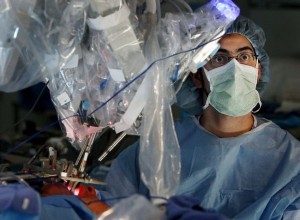The Methodist University Hospital has five robots, which perform almost 1000 operations every year. Dr. Sandeep Samant utilizes the da Vinci Surgical System to perform a throat surgery to remove the cancerous growth in a patient, James Entrekin’s throat, which is difficult to access without breaking bones or cutting flesh.
The robot using its nimble arms and wielding four instruments simultaneously reaches inside the patient’s mouth and removes the tumor, cauterizes the blood vessels, suctions the fluids and sends three-dimensional images of the entire procedure, which lasts for about two hours. Unlike traditional oral cancer surgeries, where it was essential to cut open the patient’s face and throat, here the patient would enjoy a shorter recovery period along with a much lower risk of potential complications. The patient would also not experience difficulties in speaking and swallowing.
 Surgical technician Dr. Chafeek Tomeh studies a monitor while aiding a robotic throat surgery at Methodist University Hospital.
Surgical technician Dr. Chafeek Tomeh studies a monitor while aiding a robotic throat surgery at Methodist University Hospital.
According to Dr. Samant, all this was because the natural anatomy was not cut or violated. Even though the usage of robotic surgery is still limited to a few procedures or surgeries, the robot used in Entrekin’s case has been performing a heavy case load of operations. These robots not only perform hysterectomies and neck and head surgeries but also replace heart valves, cut out cancerous lung lobes, and remove kidneys and prostates. According to the statistics, in Methodist alone it was found that robotic surgeries had increased by 40%. In other hospitals such as the Baptist, 500- 550 robotic surgeries are being performed annually. However, according to Dr. Todd Tillmanns, President of the Memphis Robotic Surgical Society, initially robots were not accepted by the medical community eagerly, as the doctors found it difficult to master the new technology, which needed a lot of time to learn. Later after attaining proficiency, they realized the advantages offered by this system.
The surgeries are mostly minimal access with smaller incisions, less blood loss and injury to the specific tissue leading to faster recovery for the patients along with much less pain. Normally, patients get to leave the hospitals within a day and need less pain medications. They return to their normal routines inside three to seven days. Entrekin after his robotic surgery revealed that despite having some minor complications he felt pain-free, vital and energetic. He states that he was not nervous about having a robot peering into his throat.